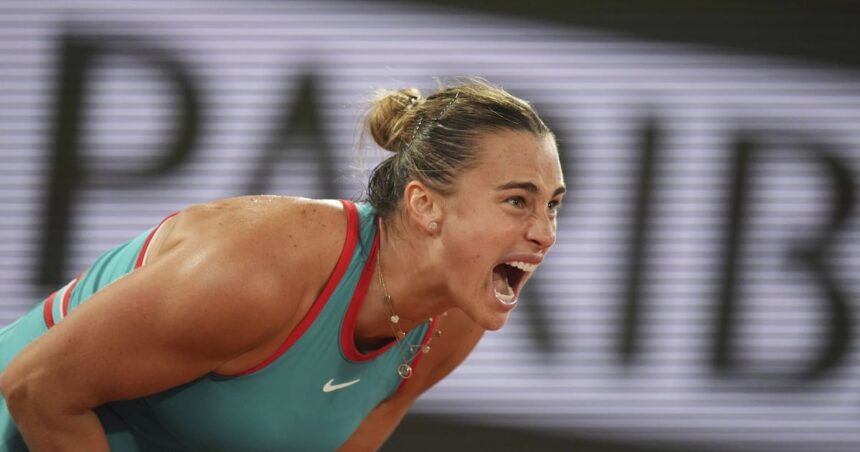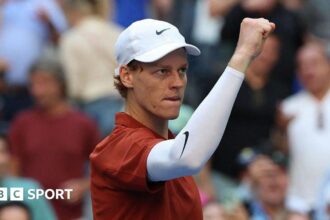Aryna Sabalenka Beats Iga Swiatek French Open 2025 to Reach Final
A dynasty has fallen on the clay courts of Roland Garros. In a display of raw power and tactical brilliance that left spectators breathless, Aryna Sabalenka has accomplished what many considered impossible—ending Iga Swiatek’s remarkable 26-match winning streak at the French Open. The seismic 6-4, 7-6 (5) victory not only secures Sabalenka’s place in the final but potentially signals a changing of the guard in women’s tennis.
The match was tennis at its purest form: a clash of contrasting styles that showcased the sport’s evolving landscape. Swiatek, the Polish phenomenon who has dominated this tournament with unparalleled consistency since 2020, found herself outmuscled and outmaneuvered by Sabalenka’s thunderous groundstrokes and newfound mental fortitude. The Belarusian’s victory wasn’t just about physical prowess—it represented the culmination of a personal journey to overcome the clay court challenges that had previously defined her career.
“This surface used to be my biggest enemy,” Sabalenka admitted in her post-match interview, her voice carrying the weight of years of disappointment on clay. “I’ve completely transformed my relationship with it.” That transformation was evident in every sliding defensive retrieve and precisely placed winner that punctuated this semifinal masterclass.
What makes this victory particularly significant is the context. Swiatek hadn’t lost at Roland Garros since 2019, accumulating three titles and building an aura of invincibility on the Parisian clay. Her streak had become almost mythological—a modern tennis record that seemed destined to grow indefinitely. Tennis historians and analysts at CO24 Culture have long documented how rare such dominant runs are in the sport’s modern era, where depth of talent has never been greater.
The match itself unfolded like a psychological thriller. Sabalenka established her dominance early, breaking Swiatek’s serve in the opening games—a statement of intent that visibly rattled the defending champion. What followed was a masterclass in pressure management, with Sabalenka weathering inevitable comeback attempts from the world’s premier clay court specialist. The tiebreak, decided by the thinnest of margins, epitomized the knife-edge tension that defined their encounter.
Beyond the immediate implications for the tournament, this result reflects broader trends in women’s tennis. The era of surface specialists appears to be waning, replaced by versatile power players capable of adapting their games to any condition. Sabalenka’s evolution from a hardcourt powerhouse to a legitimate threat on clay exemplifies this shift.
“I’ve been working on this moment for years,” Sabalenka revealed. “Not just the physical aspects, but believing I could beat her here, on her court.” That mental breakthrough might prove as important as any technical adjustment in her game.
For Swiatek, this defeat represents a rare moment of vulnerability, but hardly diminishes her clay court credentials. The Polish star’s reaction—a gracious acknowledgment of her opponent’s superior play—reinforces why she remains one of the sport’s most respected figures. “Some days, you meet someone playing at an extraordinary level,” she conceded. “Today was Aryna’s day.”
As Sabalenka advances to face her final opponent, the tennis world holds its collective breath. Has the balance of power truly shifted, or is this simply an exceptional performance from a player reaching her peak at the perfect moment? The beauty of sports lies in these inflection points—moments where narratives transform before our eyes.
What remains certain is that Sabalenka’s triumph will be remembered as one of the most significant results in recent French Open history. In dethroning clay’s reigning queen, she hasn’t just earned a shot at her first Roland Garros title—she’s rewritten what many considered impossible in modern women’s tennis. In the world of elite sports, where mental barriers often prove more formidable than physical ones, that might be her most impressive achievement yet.
This seismic shift raises fascinating questions about the future landscape of women’s tennis. Will Sabalenka’s breakthrough inspire a new approach to clay court tennis? Can Swiatek rebuild her aura of invincibility? Tennis, like all great sports, constantly reinvents itself through these moments of disruption and evolution. The opinions and analysis will flow for weeks, but today belongs to Aryna Sabalenka—the player who accomplished what seemed unthinkable just days ago.

























